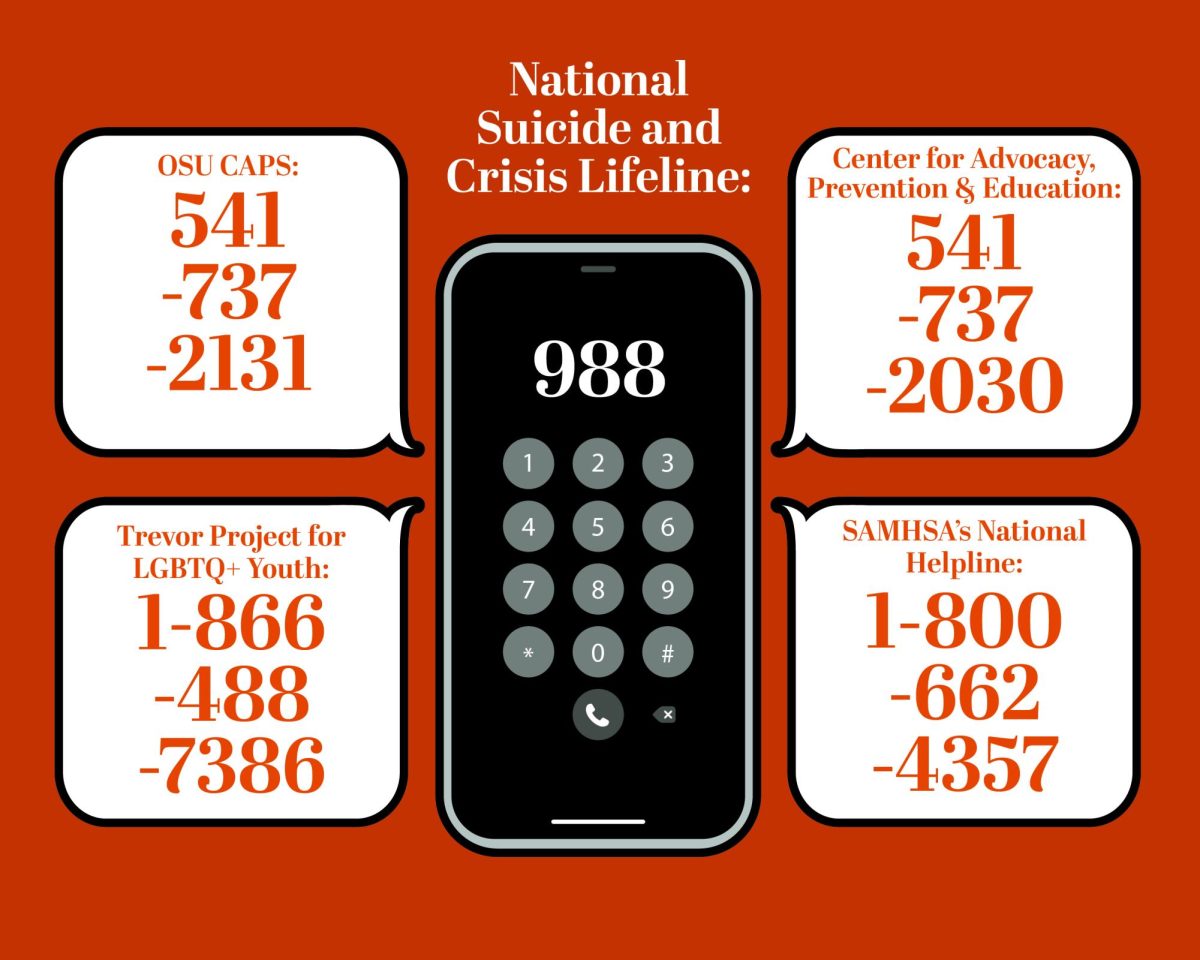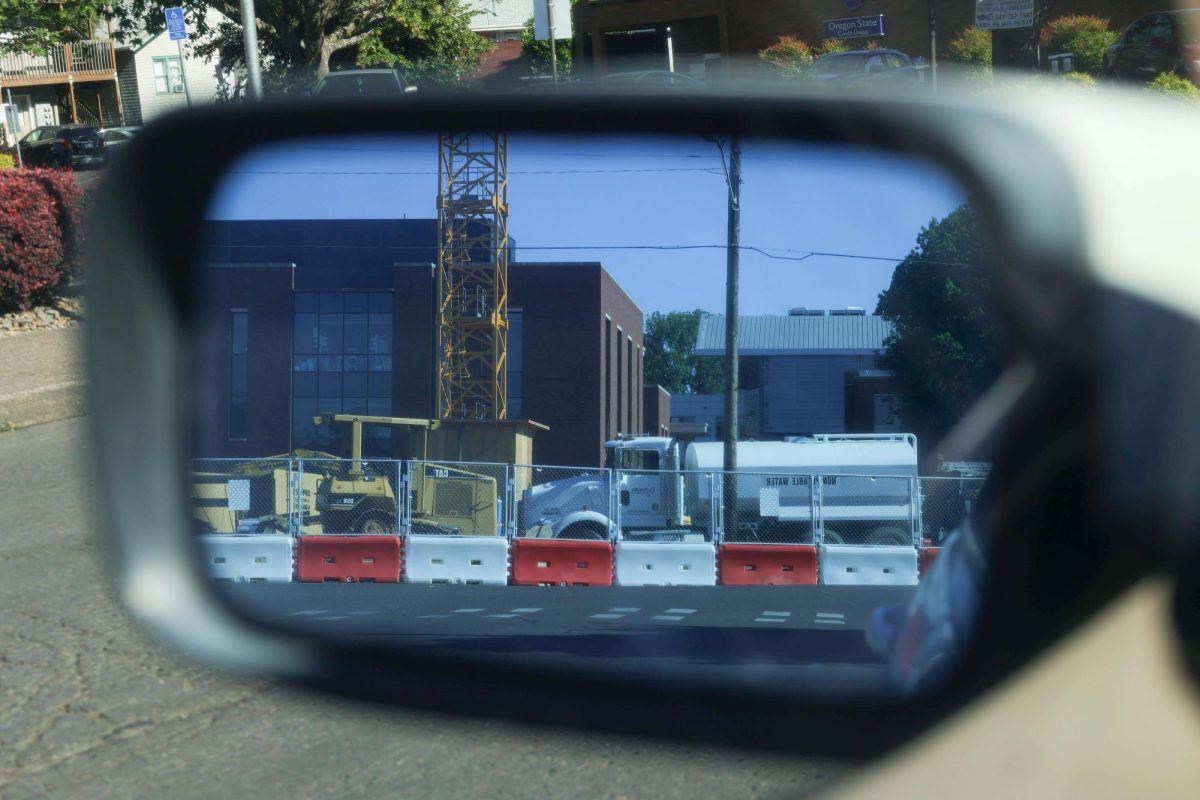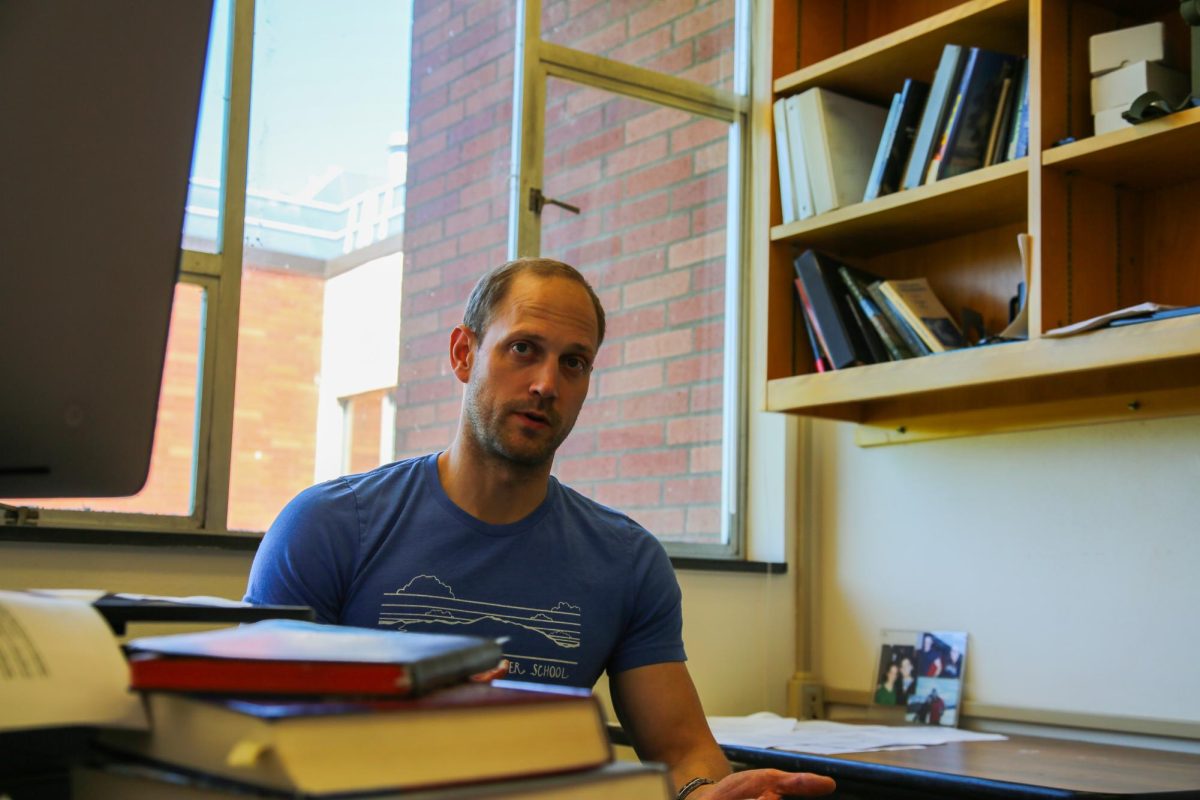For many, mental health can be a tough topic to approach and navigate, but it doesn’t have to be.
Whether it be a crisis situation, the sudden rise of heavy emotions or a reoccurring daily struggle, deciphering how to navigate the situation can feel daunting.
The foundation of taking care of your mental health can be boiled down to finding a community and knowing what resources are available.
According to Tessie Webster-Henry, mental health promotion and suicide prevention coordinator at Oregon State University’s Counseling and Psychological Services, one of the best ways to help someone who is struggling with their mental health is to “be a good friend.”
“The reason friends are so important is that you get something from giving,” Webster-Henry said. “I think we undervalue the value of each other and that’s really where human healing happens: in relationships.”
Webster-Henry pointed to empathetic and actively listening as ways that we can be supportive of others when they are struggling; preventing struggles from becoming crises.
“Be the person who reaches out to the person that’s alone,” Webster-Henry said. “There’s lots of people (who are) alone; I see people alone on campus all the time. Learn a few little icebreaker things you can do to sit next to someone and say, ‘Hey how’s it going today?’ You never know where you’re going to find that best friend.”
While connection and community are great preventative mechanisms for mental health struggles, there are times when people may need to have a more serious conversation or even realize their own limits when handling a situation.
However, according to Webster-Henry, learning skills of empathetic listening and warning signs of sever crises, like suicide, are good for students to have in their back pocket.
Kognito, an online role-based training — free to all students — simulates everyday and crisis situations in which students learn tools to interact and prevent situations, as well as recognizing when a situation may be bigger than what they can handle.
“First, if you’re going to be effective at helping someone they have to trust you and there needs to be a relationship there,” Webster-Henry said. “If you happen to be the person who notices someone struggling, … but you’re not in that position (to help them), then figure out how to get someone who is in that position to be able to help that person and empower them to do so.”
If finding connections on a campus of more than 24,000 students feels daunting, Webster-Henry advises people to keep trying and believe they are out there.
“If you really want to find some people who feel like you do and have experienced things in life like you have, I can’t think of a better place to meet those people than a group at CAPS,” Webster-Henry said.
CAPS support and therapy groups are available for those with shared identities and life experiences as well as those who want to learn to be better communicators.
Another way students find their community on campus is through university clubs and organizations.
According to Carlana So, a second-year student and peer educator for clubs and organizations, scrolling through the list of groups on ideal logic or searching your interests with “OSU” in the name on social media can be the best ways to find a group at any point in the year.
Webster-Henry said for those who are struggling, the most important thing is to not self isolate. When people self isolate, feelings of shame or being a burden can be reinforced and only make a situation worse.
“Spending time with friends or even spending time in public spaces in proximity to others can be helpful,” Webster-Henry said.
“I think being real with each other, leaning on each other, sharing when things are hard, sharing when we have a hard time with each other and working through those problems (are good things),” Webster-Henry said.
Below is a number of resources available on OSU’s campus, and in the community, for those experiencing a crisis or looking for support. For those who do not know what kind of support to look for, CAPS has a list of situations with a drop-down list of resources specific to that need available.
Crisis resources:
- OSU CAPS: 541-737-2131 (after hours, select option 1 from the phone menu); crisis walk-ins available during business hours
- National Suicide and Crisis Lifeline: 988 (call or text)
When calling select option one for veteran or service member, option two for spanish speakers, option three for LGBTQ+ and under 25 years old and option four for Indigenous callers.
- National Crisis Text Line provides text based support on a number of experiences including self harm, anxiety, depression, eating disorders and more. Text OREGON to 741-741 (text HOME if outside Oregon) or text STEVE to be connected with a BIPOC counselor). The service is also available over facebook or WhatsApp.
- Call 911 or go to the nearest hospital emergency department if your safety is in imminent danger. In Corvallis, go to Good Samaritan Regional Medical Center.
Unwanted sexual contact, stalking or interpersonal violence:
- Center for Advocacy, Prevention and Education is an on campus department available by phone 24 hours at 541-737-2030.
- Center Against Rape and Domestic Violence (CARDV) is an off campus community organization that can assist with safety concerns or other immediate needs at 541-754-0110 24 hours a day every day.
LGBTQ+ support:
- Trans Lifeline is a group run by transgender individuals focused on connecting people to community support and resources. Available by phone at 877-565-8860
- Trevor Project is a resource and education hub for LGBTQ+ young people with a 24 hour call and text line. Call line: 1-866-488-7386, text line: 678-678
Substance use and mental health support:
- Joan and Tom Skoro Collegiate Recovery Program offers students an environment to find mentorship and be involved in an environment working to increase recovery support and decrease stigma. For more information reach out via email to [email protected]
- SAMHSA’s National Helpline is available to callers get connected to treatments, referrals and community organizations available 24 hours at 1-800-662-HELP (4357)
Wellness resources:
- Wellness coaching offered by recreational sports provides assistance to students in areas of physical and nutritional health as well as stress and life satisfaction. To set up an appointment visit the website linked above or call 541-737-9355
- CAPS Mind Spa is a sanctuary space available in Snell hall for students to “soothe your mind, body and spirit”. To reserve a spot call 541-737-2131 or access the virtual spa at the link above.
- Student Health Services has a number of resources for psychiatric needs, nutrition, substance use, sexual health, physical health and general health support to OSU students only. Call 541-737-9355 to reach the after hours nurse advice line. For in-person visits check the Health Center (850 SW 26th Street) check for current hours here.














































































































